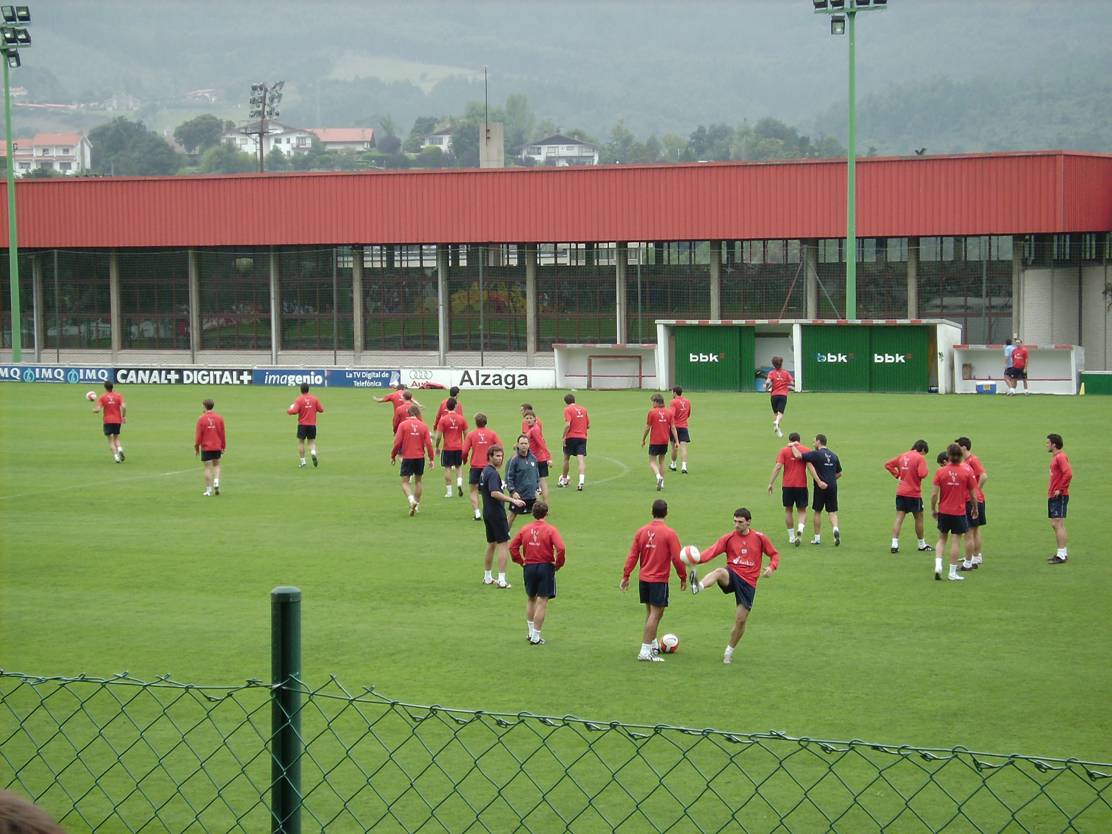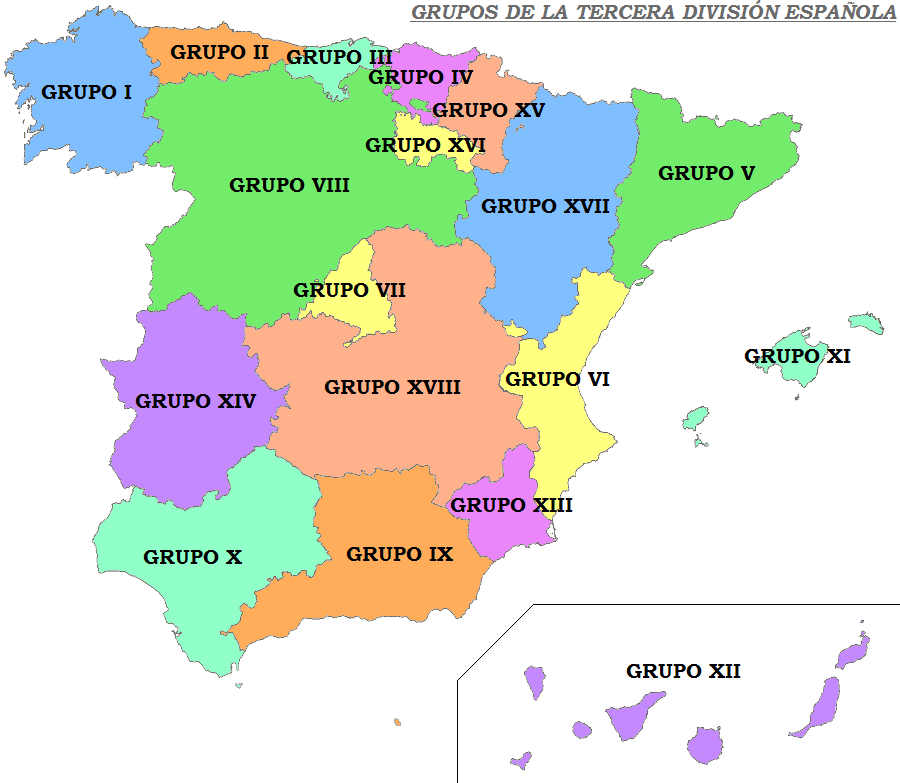|
Athletic Bilbao B
Athletic Club "B", commonly known as Bilbao Athletic, is the reserve team of Athletic Club, a football club based in Bilbao, in the autonomous community of Basque Country in Spain. The team are playing in the Primera Federación – Group 2. Founded in 1964, the team holds home matches at the small stadium attached to the club's training facility at Lezama, holding 3,250 spectators or occasionally at San Mamés Stadium, with its 53,500-seat capacity, for important fixtures. Reserve teams in Spain play in the same football pyramid as their senior team rather than a separate league. However, reserves cannot play in the same division as their senior team. Therefore, Bilbao Athletic are ineligible for promotion to La Liga. Reserve teams are also no longer permitted to enter the Copa del Rey. In addition, only under-23 players, or under-25 with a professional contract, can switch between senior and reserve teams. In recent years, most of Bilbao Athletic's players have been graduate ... [...More Info...] [...Related Items...] OR: [Wikipedia] [Google] [Baidu] |
Lezama Facilities
The Lezama Facilities ( eu, Lezamako Kirol-instalakuntzak, es, Instalaciones de Lezama), is the training ground and academy of the Primera Division club Athletic Bilbao. Located in the Lezama village around 10 km east of Bilbao, it was opened in 1971. Lezama hosts Athletic's first team for training and the league matches of Athletic EFT (women's team), as well as ten base youth teams: Bilbao Athletic (reserve team, currently playing at the Segunda División B level), women's B team, two junior teams (17 to 19 years old), two cadets (with ages between 15 and 16), two youngster teams (13 and 14) and three children's teams (the youngest, 11 and 12 years of age) which make up the club's football academy. In June 2021, the facilities also became the home ground of Segunda División newcomers SD Amorebieta as their home stadium Urritxe was deemed "impractical" to play in the category. Currently, the total area of the facilities is 14,760 m². Facilities *Field 2 with a capacity ... [...More Info...] [...Related Items...] OR: [Wikipedia] [Google] [Baidu] |
CD Basconia
Club Deportivo Basconia is a Spanish football club based in Basauri, Biscay, in the autonomous community of Basque Country. Founded on 14 March 1913, it currently plays in Tercera División RFEF – Group 4, holding home games at ''Estadio de López Cortázar'', with an 8,500-seat capacity. In 1997, they entered into a partnership with Athletic Bilbao to serve as a feeder club for Bilbao and essentially operate as the club's C team. History Founded in 1913 and named after a (later owned by the Altos Hornos de Vizcaya company), Basconia reached the national third level (''Tercera División'') thirty years later. The club played in the second tier for six seasons (1957–63), but this was before the creation of the regionalised new third division in the 1970s. In 1997, Basconia became Basque neighbours Athletic Bilbao's feeder club, not being eligible for promotion if the reserves, Bilbao Athletic, playing in the level above, did not attain the same goal. The primary funct ... [...More Info...] [...Related Items...] OR: [Wikipedia] [Google] [Baidu] |
1969–70 Segunda División ...
The 1969–70 Segunda División season was the 39th since its establishment and was played between 6 September 1969 and 7 June 1970. Overview before the season 20 teams joined the league, including 3 relegated from the 1968–69 La Liga and 6 promoted from the 1968–69 Tercera División. ;Relegated from La Liga: *Málaga * Español * Córdoba ;Promoted from Tercera División: * Orense * Bilbao Atlético *Osasuna * San Andrés * Castellón *Salamanca Teams League table Top goalscorers Top goalkeepers Results Relegation playoffs First leg Second leg Tiebreaker External linksBDFútbol {{DEFAULTSORT:1969-70 Segunda Division Segunda División seasons 2 Spain , image_flag = Bandera de España.svg , image_coat = Escudo de España (mazonado).svg , national_motto = ''Plus ultra'' (Latin)(English: "Further Beyond") , national_anthem = (English: "Royal March") , i ... [...More Info...] [...Related Items...] OR: [Wikipedia] [Google] [Baidu] |
Rafa Iriondo
Rafael Iriondo Aurtenetxea (24 October 1918 – 24 February 2016) was a Spanish football forward and manager. He amassed La Liga totals of 285 matches and 89 goals over 15 seasons, with Athletic Bilbao and Real Sociedad. He subsequently became a manager, working for nearly 30 years and being in charge of both clubs. Club career Born in Guernica, Biscay, Iriondo arrived at Basque giants Athletic Bilbao in 1940, from Atlético Tetuán. He made his La Liga debut on 29 September in a 2–2 draw at Valencia CF and, during his 13-year spell with the club, would form an historic attacking partnership with Agustín Gaínza, José Luis Panizo and Telmo Zarra, helping Athletic to the 1942–43 league and four Copa del Generalísimo trophies. After 328 official games for Athletic with 115 goals, Iriondo moved to another team in the region, Barakaldo CF, in 1953. After a couple of months, however, he returned to the top division and joined Real Sociedad, retiring shortly after the end of ... [...More Info...] [...Related Items...] OR: [Wikipedia] [Google] [Baidu] |
Tercera División
Tercera División ( en, Third Division) was the fourth tier of the Spanish football league system. Founded in 1929, it was below the ''Primera División'' (also known as La Liga), the ''Segunda División'', and the semi-professional ''Segunda División B''. For the 2021–22 season, Tercera División was replaced by Tercera División RFEF, which became the fifth tier due to the creation of a new, semi-professional third division by the Royal Spanish Football Federation, Spanish federation (RFEF) called the Primera División RFEF. Format Tercera División featured 360 teams divided into 18 regional groups, corresponding to the autonomous communities of Spain (due to its size, Andalusia is divided into two groups, East and West; Ceuta is allocated to West Andalusia, while Melilla is allocated to the East). Each group was administered by a regional football federation. At the end of the season the first four teams in each group qualified for promotion play-offs to decide which tea ... [...More Info...] [...Related Items...] OR: [Wikipedia] [Google] [Baidu] |
Agustín Gaínza
Agustín Gaínza Vicandi (28 May 1922 – 6 January 1995) was a Spanish football forward and manager. Club career Nicknamed ''Piru'', Gaínza's entire career was spent with Athletic Bilbao. Born in Basauri, Biscay, he made his official debut and scored in a Biscay Championship match on 15 January 1939 against SD Erandio Club, aged 16 years, seven months and 18 days. This made him the club's second-youngest debutant (behind Domingo Acedo in 1914), a statistic which lasted until 2009 when Iker Muniain surpassed the appearance record by seven days and equalled the scoring one the following week. Gaínza made his La Liga debut on 13 October 1940 in a 1–0 away loss against Hércules CF, then proceeded to play a total of 19 seasons in the competition with the same team, amassing totals of 380 games and 119 goals. During his spell with the ''Lions of San Mamés'' he won nine major titles, including two national championships and seven Copa del Generalísimo trophies, plus a Biscay ... [...More Info...] [...Related Items...] OR: [Wikipedia] [Google] [Baidu] |
1939 Copa Del Generalísimo
The 1939 Copa del Generalísimo was the 37th staging of the Copa del Rey, the Spanish football cup competition. The competition started on 14 May 1939 and concluded on 25 June 1939 with the final, held at the Montjuïc Stadium in Barcelona. Round of 12 *Racing Santander and Donostia received a bye. Quarter-finals Semi-finals Final External linkswww.linguasport.comLFP website {{DEFAULTSORT:Copa Del Rey 1939 domestic association football cups |
Bizcaya (football Team)
Bizcaya, also known as Bizcaya FC or Club Bizcaya (Vizcaya in Spanish) was an association football representative team from Bilbao, Spain, which participated in the 1902 Copa de la Coronación and the 1907 Copa del Rey, winning the former. In this respect, the team is similar to London XI. It intended to create a team especially for the tournament using the best players from each Bilbao-based club: Bilbao Football Club and Athletic Club in 1902, and Athletic Club and Unión Vizcaino in 1907. History Origins At the end of 1901, the two most important clubs in the city were Athletic Club and Bilbao FC, and thus, a rivalry soon arose between them, playing several friendlies at the Hippodrome of Lamiako, which the two teams shared since there were hardly any fields in Bilbao. Their duels aroused great expectation and served as one of the drivers of football as a mass phenomenon in Bilbao, but despite the sporting rivalry between them, their relations were friendly, and thus, the ... [...More Info...] [...Related Items...] OR: [Wikipedia] [Google] [Baidu] |
Biscay Championship
The Biscay Regional Championship ''(Campeonato Regional de Vizcaya)'', also called the North Regional Championship ''(Campeonato Regional Norte)'' in its early editions, was an official football tournament in Spain organised by the North Football Federation. It was played annually between 1913 and 1940 and served to elect the representatives of the region in the Spanish Cup, which at that time served as the overall annual national championship. History The tournament was launched in 1913, following the creation of the North Football Federation (''Federación Norte''), initially consisting of clubs from the Basque provinces (Biscay, Gipuzkoa and Álava) and Cantabria (then the province of Santander). The first edition of the Northern Regional Championship started on 12 October 1913, with six teams: three from Biscay (Athletic Bilbao, Arenas Club de Getxo and Deportivo de Bilbao) and three from Gipuzkoa (Real Sociedad, Sporting de Irun and Racing de Irun – the latter two would s ... [...More Info...] [...Related Items...] OR: [Wikipedia] [Google] [Baidu] |
CD Euzkadi
Club Deportivo Euzkadi was an association football team that played in the Primera Fuerza league in Mexico during the 1938–39 season. It was formed when the Basque Country national football team, which had been touring the world, was refused permission by the world governing body of association football FIFA, to play any more FIFA affiliated teams due to political issues arising from the ongoing Spanish Civil War. As a result of this ruling the team decided to stay in Mexico and participate in the Mexican domestic league under the name Club Deportivo Euzkadi, a move which FIFA allowed. Origin of team In 1936 the Spanish Civil War broke out. On one side was the Republican faction, supported by the Soviet Union and International Brigades, and on the other side was the Nationalist faction, and supported by the Third Reich and Fascist Italy. The Basque regional Government in the north of Spain sided with the Republican Government. In 1937 in the midst of the civil war, Jos� ... [...More Info...] [...Related Items...] OR: [Wikipedia] [Google] [Baidu] |
José Antonio Aguirre (politician)
José Antonio Aguirre y Lecube (6 March 1904 – 22 March 1960) was a Basque politician and activist in the Basque Nationalist Party. He was the first president of the Provisional Government of the Basque Country and the executive defense advisor during the Spanish Civil War. Under his mandate, the Provisional Government formed the Basque Army and fought for the Second Spanish Republic. Early life José Antonio Aguirre was born in Bilbao, Biscay, Spain. He studied in the Basque Country's first Ikastola, a school in which all lessons were given in Basque. He later studied law at the University of Deusto. After his father's death in 1920, Aguirre moved with his family to Algorta, near Bilbao. At 16 years of age, he had to become a father figure to his 10 younger brothers and sisters. After finishing his law studies, he began working in the family business, Chocolates Aguirre. He later took responsibility for the business and introduced many reforms, including free health c ... [...More Info...] [...Related Items...] OR: [Wikipedia] [Google] [Baidu] |
.jpg)




